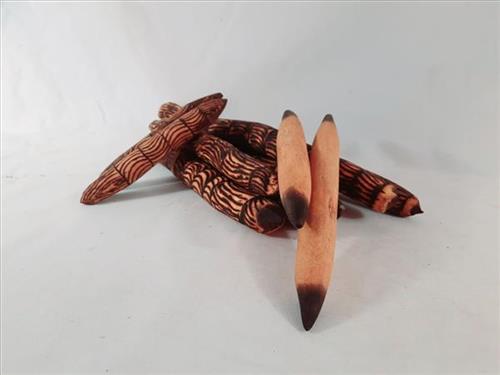11483999382
Status: Stock
Timpilypa ~ Music Sticks
Known collectively as punu, the carvings of Anangu (Central and Western Desert Aboriginal people) have their beginnings in the Tjukurpa when the Creation Ancestors fashioned the first weapons and tools, setting down the laws and conventions of their design. Highly experienced craftsmen having grown up making traditional tools and weapons under the instruction of their fathers and grandfathers. The knowledge involved in this is inherited and passed on through the Tjukurpa or traditional Law. Inma or ceremony is one way in which this is done.
‘Munu timpilypa ngarinyi, laka purunypa. Laka purunypa….lakara lakara kulira panya palyaningi. Timpilypa alatjitu.’ Anangu tjilpi
There are small sticks you make a sound like a clap with…clap clap, listening closely then crafting them. That’s how you get music sticks. Senior Western Desert Aboriginal man
Rhythmic accompaniment to singing and dancing is part of celebrating the Tjukurpa. Timpilypa are used by both men and women and played by holding one stick loosely in the hand while striking it with the other in a slow rhythmic beat. Differences in pitch and tone are achieved by varying the point and intensity of contact.
A larger single stick can also used to pound the earth while singing. Sometimes though, it is a pair of uncarved sticks plucked from the handiest tree



